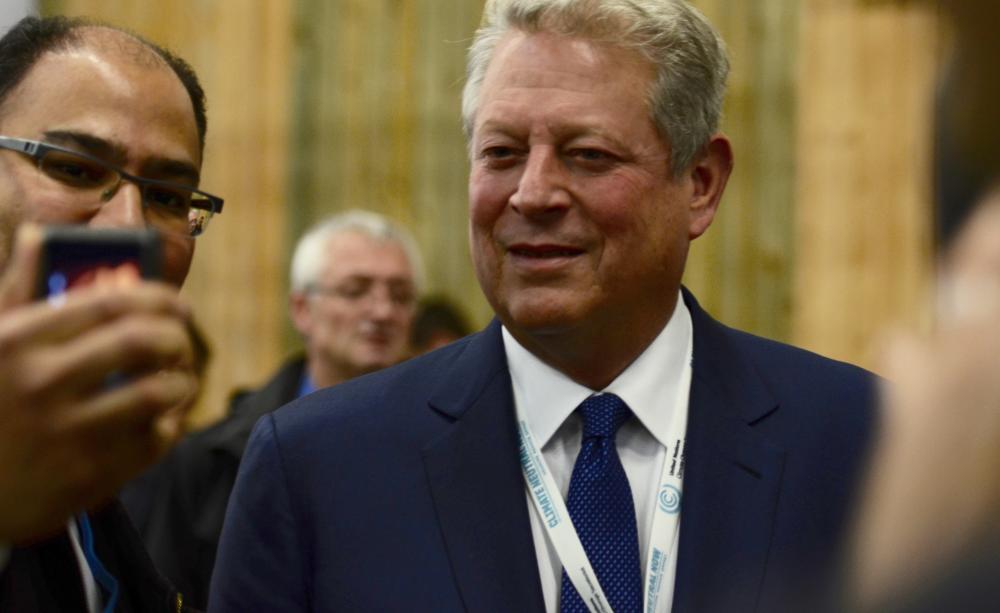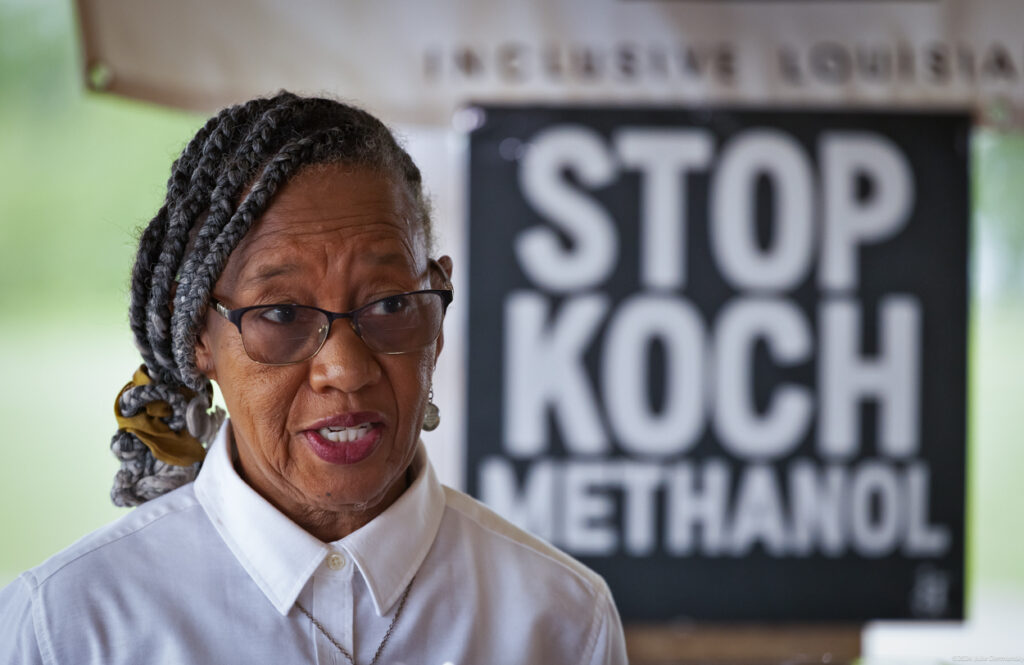Donald Trump has threatened to withdraw the United States from the Paris Agreement – making America the only country on earth to opt out of the climate accord. Al Gore is captured in the new film An Inconvenient Sequel looking distressed at the election of Trump in 2016. Here, one of the film’s directors tells The Ecologist’s Brendan Montague how Gore made it clear that he fears Trump is a danger to our planet.
Gore features in An Inconvenient Sequel: Truth to Power – which is released on DVD on 11 December – and follows a decade after his Oscar winning blockbuster An Inconvenient Truth. The film shows Gore’s increasing despondency during 2016 as Trump successfully campaigns for the presidency.
The latest documentary is directed by Bonni Cohen and Jon Shenk, who spent almost two years filming and speaking with Gore – including behind the scenes during the Conference of the Parties negotiations held in Paris at the end of 2015.
Bonni and Jon document the highs and lows of climate campaigning in the intervening decade. The co-directors had previously worked together making the challenging Audrie & Daisy, which premiered at the Sundance Film Festival in 2016 before being taken up as a Netflix original. The film does not, however, provide a simple fairy tale ending. The election of Donald J Trump as the 45th president of the United States haunts, spectre-like.
The Ecologist’s Brendan Montague speaks with the directors about Trump, Gore and much more:
Trump election
Brendan Montague (BM): First of all, I just wanted to say that I thought the film was fantastic, a masterclass in climate communication, both in form and in content. Watching the film, obviously the election of Donald Trump comes in towards the end. I was curious to know what Al Gore’s view was of Donald Trump. It was reported in The Guardian that he had given up trying to educate him, but I wanted to find out if you knew any more of the background.
Jon Shenk (JS): It might make sense to ask him directly what his latest thinking is. What we’ve heard him say over the months, I think during the campaign, in the film you see Al Gore monitoring the campaign a bit because we were shooting during [20]15 [and 20]16 and I think that Al had some hope that given Trump’s business background that he could help him understand the tremendous business opportunity that exists in the United States for ‘alternative’ energy. The solar industry is five or six times the coal industry in terms of jobs and the wind industry is generating some of the fastest growing jobs in the country.
So I think there was some hope that Trump could see that. Unfortunately, Trump has backed away from alternative energy and has moved towards coal and fossil fuels in so many ways in his administration. And I think Al really sees, my sense is, that: he really sees Trump as quite dangerous in terms of the climate crisis.
Trump 2020?
BM: My second question, before I move away from this issue, is whether Al Gore thinks Donald Trump could win in the 2020 election and what that would mean for the climate and the rest of the planet?
JS: I’m sure that Al does not know what will happen in 2020, along with the rest of us. I think the really amazing thing, and you see this in the film, is that even though Trump gets elected and is certainly moving towards policies that are dangerous for the environment – pulling out of the Paris accords being chief among them – the amazing thing is that other countries have not followed that path. All the other countries that have signed the Paris agreement are still in it. Even in the United States, you see this incredible groundswell of support for solving the climate crisis.
You see governors of states like Jerry Brown in California and others, CEOs of major corporations, mayors of cities. You know, Trump said he was elected to be president of the people of Pittsburgh and not Paris, but within a day the mayor stood up and said, ‘wait a minute, I am mayor of Pittsburgh and the people of Pittsburgh want to recommit America to solving the climate crisis’.
There are a lot more people in our country who actually believe in man-made climate change and believe it’s a priority to solve. It just so happens that we are governed now by a party that disagrees with its constituents. I think there is some hope that there will be a backlash to that, but in the meantime there is a lot of great work going on – despite the leadership.
Deeply demoralising?
BM: The film opens with seeing the very direct and immediate impact of climate change: the melting glaciers and their impact, the way that may be driving flooding in the US. Was that deeply demoralising to see that, was it terrifying? What were the emotions that that brought to you?
BC: It was really terrifying and sad to be in Greenland at the foot of a glacier and watching it melt, and melting faster than the last time Al Gore was there. To see a man who had dedicated, you know, 40 years of his life to trying to solve the climate crisis – that’s about as real as it gets…But again, when you start to talk to the scientists, while it’s really devastating, there is finally some movement in a positive direction, so you have to think about those things in order to get through the day.
Pessimism or optimism?
BM: For me the film very much follows a narrative arc where Al Gore expresses his own dismay and pessimism at the beginning of the film and then you watch him be able to have a positive impact on the Paris Agreement and then finally towards the end he is expressing more optimism. I was wondering whether you may sit on the spectrum – having gone through the process of making the film and looking at a lot of the impacts of climate change – are you personally optimistic or pessimistic about the future?
Bonni Cohen (BC): Let me put it this way, I think I would be a lot more pessimistic if I had not spent 18 months with Al Gore actually in the field, making the sausage, having the meetings, working across interdisciplinary lines with professionals of all kinds to get to the bottom of just how possible the solutions are. I think because we were given that great opportunity and privilege to do this work at this time we feel very optimistic, very much more optimistic than we would have had we not been on the frontline, observing.
If you just read the normal media cycles and all the propaganda being put forward by both sides, but certainly the by political right, and their arguments against the climate solutions as fuelled by the oil industry et cetera, it’s easy to get paralysed by fear and certainly that has been additionally fuelled by the Trump presidency. In reality, if you go out and speak to the scientists and the industry leaders who are making the alternative energy revolution possible you have the opportunity to see it more clearly and have more optimism.
Personal influence
BM: The film is carried through the personal journey of Al Gore. In your personal view, is the solution to climate change resting on individuals who are political and have clearly a lot of personal influence, or is it more about everyday folk in everyday jobs, with everyday concerns?
JS: That’s a really great question. I think that our feeling is that it is, ‘all of the above’. The exciting thing – and you see this in the film – is no matter who you are – whether you are a grade-school student, a CEO of a company, a politician, a journalist, a homeowner, whoever you are, you can now make a difference.
You can use your voice, you can express yourself to your leaders, you can use your vote, you can tell your leaders you will vote against them unless they are on the right side of this issue. You can use your consumer influence. You can tell the company that you use in your life that you care and you prioritise solving the climate crisis.
In California – there are many places around the world now – you can call companies and have them to put solar panels on your roof and save money from your electricity bill. This was not true 10 or 15 years ago, these things are changing. You see that in the film.
You actually see in the film a Trump-supporting Conservative mayor in the heart of Texas decide to take his town carbon neutral with electricity generation because he knows it will save the city money and, by the way, he’s very proud of the fact the air in his the city is cleaner because they are not burning coal and fossil fuels any more.
I hate to use the word lightly, but there is a revolution going on right now about the way energy gets made. This is partly because a previous generation woke up to this and got to work. We met hundreds of people who saw An Inconvenient Truthand decided to change their lives in one way or another vis-à-vis climate change.
We are now seeing the same thing in this movie. Later today, I am going to be interviewed by a fourth grade journalist blogger for her newsletter at her school because she saw the movie and she wanted to spread the word about the climate crisis among her 10-year-old peers in the US. So we really feel like there is a tremendous amount that anybody can do now and that’s the really exciting time we are now in, in history.
Single action
BM: The film ends with a few quick suggestions about what people can do personally. Having watched your film, I felt very motivated – I wanted to take action. I was wondering, what is the easiest thing a private individual can do? What single action would you like them to take having seen your film, if they too feel motivated?
JS: Well, it really depends on who you are of course. But I think the single most powerful thing for Bonni and me has been to simply ask ourselves, ‘What can we do? What is within reach?’ What can we do in our home? What can we do with a company that we work at? What can you do at our children schools?’
A lot of it is simply asking questions. Having a student ask their principal at the school, ‘Where does electricity come from? Is there any way we can move towards alternative energy?’ If you work at a company, then speaking to your boss about its climate policies, and its power generation policies.
These are not unreasonable questions any more. The answers used to cost a great deal more money than burning fossil fuels but nowadays there is a tremendous amount of savings that many companies, and schools, and cities, and states can get. That is the exciting thing for us. Simply asking yourself, ‘What can I do? What can happen in my own life in a simple way, whether I am a CEO of a company or student in grade-school? ‘The answer is always, ‘Yes, there is something I can do’. It just starts by simply asking questions.
This article has been cross-posted from The Ecologist. Brendan Montague is editor of The Ecologist. He tweets at @EcoMontague. To find out more about the film, visit the official website.
Photo via The Ecologist
Subscribe to our newsletter
Stay up to date with DeSmog news and alerts






